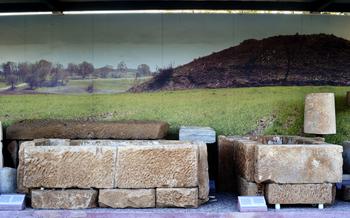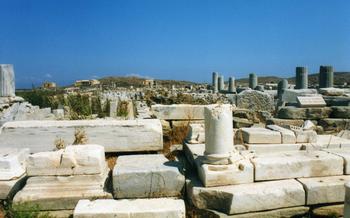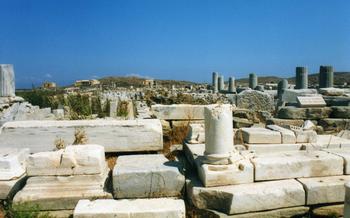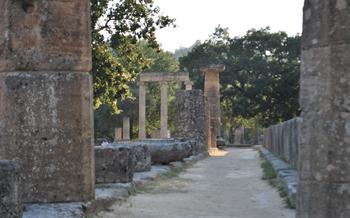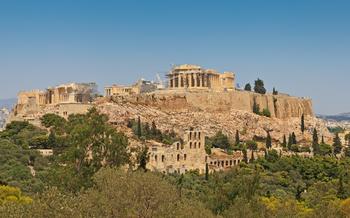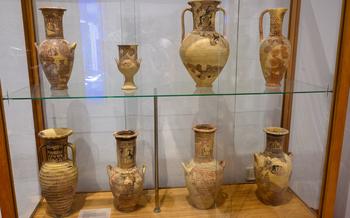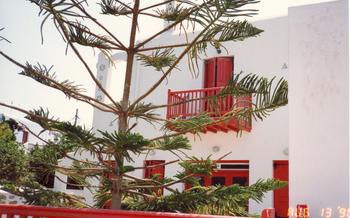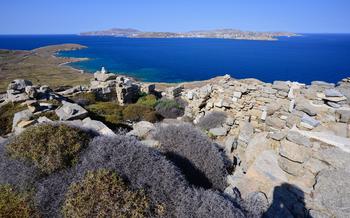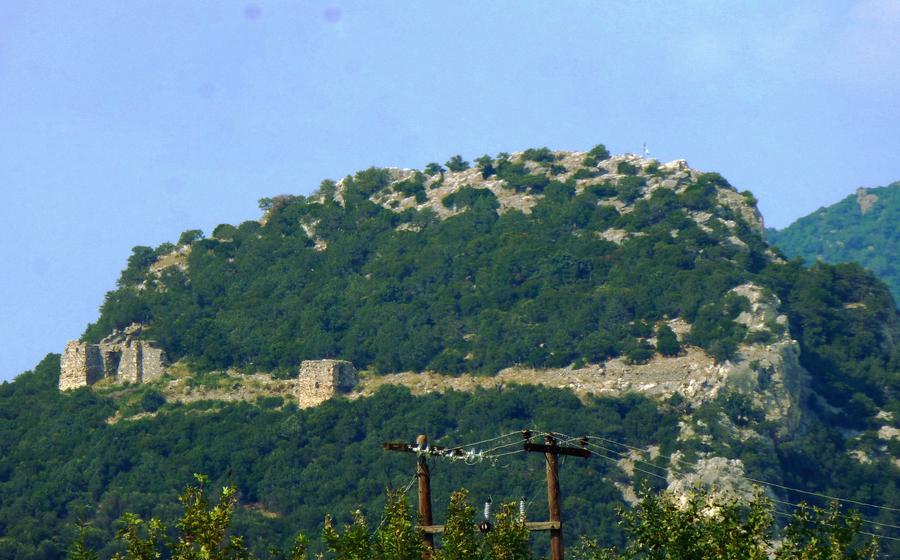
Abdera Archaeological Site
- Abdera Archaeological Site: A Journey Through Time
- Unearthing the Past: Archaeological Discoveries
- The Agora: Center of Ancient Life
- The Temple of Apollo: A Divine Abode
- The Theater: Stage for Ancient Drama
- The City Walls: Guardians of Abdera
- The Necropolis: Eternal Resting Place
- The Museum of Abdera: A Treasury of History
- Walking Through History: Exploring Abdera's Streets
- Festivals and Events: Reviving the Past
- Local Cuisine: A Taste of Abdera
- Accommodation and Amenities: A Comfortable Stay
- Getting There and Around: Practical Information
- Insider Tip: Unveiling Hidden Gems
Abdera Archaeological Site: A Journey Through Time
Abdera, an ancient Greek city located in the northeastern part of Greece, boasts a rich and fascinating history that dates back to the 7th century BC. The Abdera Archaeological Site, situated on the outskirts of the modern city of Alexandroupoli, offers visitors a glimpse into this glorious past.
Historical Significance: Abdera played a significant role in ancient Thrace, serving as a prosperous trading center and a hub of intellectual and cultural exchange. It was renowned for its philosophers, poets, and scientists, including the famous Democritus, known as the "Laughing Philosopher."
Location: The archaeological site is conveniently situated just a short distance from the city center, making it easily accessible for visitors. Immerse yourself in the ancient world as you step through the gates of this remarkable site, where history comes alive.
Highlights of the Site: The Abdera Archaeological Site features an array of well-preserved ruins and monuments that showcase the architectural prowess and cultural achievements of ancient Greece. Among the highlights are the impressive Agora, the sacred Temple of Apollo, the awe-inspiring Theater, and the well-fortified City Walls. Wander through the ancient streets, admire the intricate mosaics, and uncover the secrets of this once-thriving city.
Unearthing the Past: Archaeological Discoveries
Extensive excavations conducted at the Abdera Archaeological Site have yielded a wealth of archaeological treasures that provide valuable insights into the city's rich past. Among the most significant discoveries are the remains of several temples, including the impressive Temple of Apollo, as well as a well-preserved theater, a gymnasium, and an extensive agora, or marketplace. These structures offer a glimpse into the religious, cultural, and civic life of ancient Abdera.
Excavations have also unearthed a vast collection of artifacts, including pottery, coins, jewelry, tools, and sculptures. These artifacts shed light on the everyday lives of the city's inhabitants and their artistic and technological achievements. Notably, the discovery of numerous inscriptions, including decrees, laws, and religious texts, has provided crucial information about Abdera's political, social, and economic systems.
The archaeological discoveries at Abdera have significantly contributed to our understanding of ancient Greek civilization. They have revealed the city's important role as a center of trade, culture, and learning, and have provided valuable insights into the daily lives of its citizens. These findings have helped piece together the rich tapestry of ancient Greek history and have made Abdera a must-visit destination for anyone interested in exploring the roots of Western civilization.
The Agora: Center of Ancient Life
The agora, the heart of ancient Abdera, served as the bustling hub of social, economic, and political activities. This central square was a place where citizens gathered, exchanged ideas, conducted business, and participated in civic affairs. Its strategic location within the city walls ensured easy access for all residents.
The agora's layout featured a spacious open area surrounded by stoas, or covered walkways, which provided shade and protection from the elements. These stoas housed shops, workshops, and stalls, where merchants sold their wares, ranging from pottery and textiles to agricultural products. The agora's vibrant marketplace hummed with activity as locals haggled over prices, farmers showcased their produce, and traders from distant lands displayed exotic goods.
Beyond its commercial significance, the agora served as a crucial venue for political discourse and decision-making. Citizens assembled in the agora to attend public meetings, where they debated issues of governance, voted on important matters, and listened to speeches by elected officials. This interactive space fostered a sense of civic engagement and collective responsibility among the inhabitants of Abdera.
The Temple of Apollo: A Divine Abode
Standing as a testament to ancient Greek devotion and architectural prowess, the Temple of Apollo is a sacred site within the Abdera Archaeological Site. Dedicated to the revered god Apollo, the temple showcases exquisite features that offer a glimpse into the religious and cultural practices of Abdera's past.
Built in the 5th century BC, the temple's Doric architectural style exudes simplicity, harmony, and strength. Its imposing columns, crafted from local marble, support a triangular pediment that once adorned intricate sculptures depicting mythological scenes. The temple's grand entrance, adorned with decorative moldings, leads to a spacious cella, where a colossal statue of Apollo likely once stood, commanding the devotion of worshippers.
Beyond its architectural magnificence, the Temple of Apollo held immense religious significance. As the patron deity of music, poetry, healing, and prophecy, Apollo was deeply revered in ancient Abdera. The temple served as a place of worship, offering and prayers, and seeking divine guidance. Devotees would flock to the temple to honor Apollo, participate in religious festivals, and seek oracles from his priests.
Myths and legends intertwined with the Temple of Apollo, adding to its allure and mystique. It was believed that the temple was built on the very spot where Apollo had slain the giant serpent Python, a symbol of chaos and darkness. The temple's proximity to a sacred spring further enhanced its reputation as a place of healing and purification.
Today, the Temple of Apollo stands as a poignant reminder of the deep religious devotion that permeated ancient Greek society. Its ruins, though weathered by time, still exude an aura of sanctity, inviting visitors to contemplate the spiritual beliefs and practices that once flourished within these sacred walls.
The Theater: Stage for Ancient Drama
In the heart of the Abdera Archaeological Site, the ancient theater stands as a testament to the city's rich cultural heritage. With a seating capacity of approximately 4,000 spectators, this impressive structure served as a venue for theatrical performances, festivals, and civic assemblies.
The theater's acoustics are remarkable, allowing the actors' voices to carry clearly throughout the auditorium. The stage, which measures approximately 12 meters in diameter, was once adorned with elaborate stage sets and costumes, bringing ancient Greek dramas to life.
During the summer months, the theater was transformed into a vibrant hub of entertainment, hosting performances of tragedies, comedies, and satyr plays. These plays, often infused with social commentary and philosophical insights, were integral to ancient Greek culture and provided a platform for discussing contemporary issues.
The theater also served as a venue for festivals and religious ceremonies, where citizens gathered to honor their gods and celebrate important events in the city's history. The theater's grand architecture and acoustics created an awe-inspiring setting for these sacred rituals.
Attending a performance at the ancient theater of Abdera is a unique and immersive experience, allowing visitors to step back in time and witness the birthplace of Western drama.
The City Walls: Guardians of Abdera
Defensive Fortifications:
The city walls of Abdera served as a vital defense mechanism, protecting the city from potential invaders and ensuring the safety of its inhabitants. Constructed with sturdy materials and meticulously designed fortifications, the walls stood tall and strong, forming an impenetrable barrier around the city.
Gates and Towers:
Strategically positioned gates provided controlled access to the city, allowing for the regulation of movement and trade. These gates were often reinforced with towers, which served as observation points for guards and provided additional defensive capabilities. The towers also acted as watchtowers, enabling the city's defenders to keep a vigilant eye on the surrounding landscape and detect any approaching threats.
Significance in Protecting the City:
The city walls played a crucial role in safeguarding Abdera throughout its history. They withstood numerous attacks and invasions, effectively deterring potential aggressors and ensuring the city's longevity. The walls not only provided physical protection but also instilled a sense of security and confidence among the citizens, allowing them to thrive and prosper within the city's confines.
The Necropolis: Eternal Resting Place
Location and Types of Tombs: The necropolis of Abdera, situated outside the city walls, served as the eternal resting place for its inhabitants. Excavations have revealed a vast array of tombs, ranging from simple pits and cist graves to elaborate chamber tombs. These tombs vary in size and design, reflecting the social status and wealth of the deceased.
Funerary Customs and Beliefs: The necropolis provides valuable insights into the funerary customs and beliefs of ancient Abdera. The presence of grave goods, such as pottery, jewelry, and personal items, suggests a belief in an afterlife where the deceased would require these possessions. Elaborate tomb structures and inscriptions often expressed the grief and love of the living for their departed loved ones.
Artifacts Found in the Tombs: Excavations of the necropolis have yielded a wealth of artifacts that shed light on the daily lives and beliefs of the ancient Abderans. These artifacts include pottery vessels, bronze and iron tools, coins, jewelry, and terracotta figurines. The discovery of imported goods from distant lands, such as pottery from Athens and Corinth, highlights Abdera's extensive trade connections.
The Museum of Abdera: A Treasury of History
The Museum of Abdera stands as a testament to the city's rich past and cultural heritage. Within its walls, visitors can embark on a journey through time, immersing themselves in the fascinating world of ancient Abdera. The museum houses an extensive collection of artifacts unearthed during excavations at the archaeological site, offering a glimpse into the lives and customs of the city's inhabitants.
Exhibits and Artifacts
The museum's exhibits are meticulously curated, showcasing a diverse array of artifacts that tell the story of Abdera's evolution from a humble settlement to a thriving polis. Visitors can marvel at intricate pottery, elegant sculptures, and finely crafted jewelry that speak to the artistic prowess of the ancient Abderites. Inscribed tablets and coins provide insights into the city's economy and administration, while everyday objects like tools, utensils, and toys offer a glimpse into domestic life.
Interactive Displays and Educational Programs
The Museum of Abdera goes beyond static displays, employing interactive exhibits and educational programs to engage visitors of all ages. Touchscreens and multimedia presentations bring the ancient world to life, allowing visitors to explore the city's history, architecture, and mythology in a dynamic and immersive way. Guided tours and workshops provide opportunities for in-depth learning and hands-on experiences, making the museum a valuable resource for students, researchers, and history enthusiasts alike.
Importance for Preserving and Showcasing Abdera's Past
The Museum of Abdera plays a crucial role in preserving and showcasing the city's rich cultural heritage. By housing and exhibiting artifacts from the archaeological site, the museum ensures that these precious relics are protected and accessible to the public. The museum's educational programs foster a deeper understanding and appreciation of ancient Greek history and culture, inspiring future generations to explore and safeguard their heritage.
Walking Through History: Exploring Abdera's Streets
Abdera was a well-planned city with a rectangular grid system. The city was divided into blocks, each containing houses, shops, and public buildings. The main street, called the decumanus maximus, ran east-west through the city, connecting the agora with the theater and the gymnasium. The cardo maximus, the north-south street, intersected the decumanus maximus at the agora.
Many notable landmarks and monuments can be found along these streets. Some highlights include the Temple of Apollo, the well-preserved city walls, various impressive ancient houses, and the remains of the city's aqueduct. Visitors can take a leisurely stroll through the streets of Abdera, admiring the ancient ruins and imagining what life was like in this bustling city over 2,000 years ago.
One of the most popular tourist attractions in Abdera is the House of Amphipolis Mosaic. This well-preserved mosaic floor depicts a variety of scenes from Greek mythology, including the birth of Aphrodite, the judgment of Paris, and the battle between Achilles and Hector. The mosaic is a testament to the artistic skill of the ancient Greeks and is a must-see for any visitor to Abdera.
Festivals and Events: Reviving the Past
Abdera's cultural heritage is celebrated and brought to life through a variety of festivals and events that take place throughout the year. These events offer visitors a unique opportunity to experience ancient Greek customs, traditions, and arts firsthand.
One of the most popular festivals is the Abdera Festival, held annually in August. This grand celebration features traditional music, dance performances, theatrical productions, and reenactments of ancient rituals. Visitors can immerse themselves in the sights, sounds, and flavors of ancient Greece, as the city comes alive with vibrant energy and excitement.
Another highlight is the International Symposium on Abdera, held biennially. This prestigious event brings together scholars, historians, and archaeologists from around the world to discuss and share their research on Abdera and its significance in ancient Greece. Participants engage in lively debates, present their findings, and contribute to a deeper understanding of the city's rich past.
For those interested in the culinary arts, the Abdera Gastronomic Festival is a must-attend event. Held annually in September, this festival showcases the region's traditional dishes and delicacies, as well as innovative creations inspired by ancient Greek cuisine. Visitors can indulge in a variety of flavors, from fresh seafood and local produce to mouthwatering pastries and desserts.
These festivals and events not only provide entertainment and cultural immersion but also serve as a bridge between the past and the present, allowing visitors to experience the enduring legacy of Abdera in a vibrant and engaging way.
Local Cuisine: A Taste of Abdera
Abdera's culinary scene is a delightful blend of traditional Greek flavors and local specialties. Fresh seafood, caught daily from the Aegean Sea, takes center stage in many dishes. Sample succulent grilled octopus, tender calamari, or flavorful shrimp saganaki, a dish cooked in a rich tomato sauce with feta cheese.
For a taste of the land, try the mouthwatering souvlaki, succulent skewers of grilled meat served with pita bread, tzatziki sauce, and fresh vegetables. Vegetarians will delight in the variety of meze dishes, small plates of appetizers featuring grilled vegetables, stuffed vine leaves, and creamy dips like hummus and tzatziki.
Indulge in the local specialty, Abderitiki gavros, small fried fish served with lemon and ouzo, the traditional Greek anise-flavored spirit. Don't miss the chance to savor kadaifi, a crispy filo pastry filled with sweet nuts and drizzled with honey syrup, a perfect way to end your meal on a sweet note.
To experience the authentic flavors of Abdera, venture into the narrow streets and discover charming tavernas and restaurants. Many establishments offer outdoor seating, allowing you to soak in the lively atmosphere while enjoying your meal. Whether you prefer a casual lunch by the sea or a romantic dinner in a traditional setting, Abdera's culinary delights will tantalize your taste buds and leave you craving for more.
Accommodation and Amenities: A Comfortable Stay
Abdera offers a range of accommodation options to suit every budget and preference. From cozy guesthouses and traditional family-run hotels to modern resorts and vacation rentals, visitors can find the perfect place to rest and recharge after a day of exploring the ancient ruins and immersing themselves in the local culture.
For those seeking a truly immersive experience, traditional guesthouses provide a glimpse into the warm hospitality and charm of Abdera. These small, family-run establishments often offer a personalized touch, with hosts sharing stories about the town's history and recommending hidden gems to explore.
For those seeking modern amenities and comfort, a range of hotels offer a variety of services and facilities. From swimming pools and fitness centers to elegant dining options and spacious rooms with stunning views, these hotels provide a luxurious retreat after a day of exploration.
For those seeking independence and flexibility, vacation rentals offer a home-away-from-home experience. These fully equipped apartments or houses provide the convenience of cooking meals, relaxing in private spaces, and enjoying the freedom to set their own schedule.
Regardless of the accommodation choice, visitors will find that Abdera has all the essential facilities and services they need for a comfortable stay. Banks, supermarkets, pharmacies, and medical facilities are easily accessible, ensuring that visitors have everything they need within reach.
Getting There and Around: Practical Information
Reaching Abdera:
- By Air: The nearest airport to Abdera is the Alexandroupolis International Airport (AXD), approximately 15 kilometers away. Direct flights are available from various cities in Greece and internationally.
- By Road: Abdera is well-connected by road, with national highways linking it to major cities and regions in Greece. Self-driving or renting a car is a convenient option for exploring the area.
- By Bus: Regular bus services operate from Alexandroupolis and other cities to Abdera. The bus station is located near the city center, providing easy access to accommodation and attractions.
Navigating Abdera:
- On Foot: The best way to explore Abdera's historical sites and charming streets is on foot. The city is relatively small, making it easy to get around and discover hidden gems.
- By Bicycle: Cycling is a popular way to explore the city and its surroundings. Several bike rental shops are available, offering various types of bicycles to suit different needs.
- By Public Transportation: Abdera has a limited public transportation system, with buses connecting the city center to nearby areas. However, most attractions are within walking distance of each other.
- Taxis: Taxis are readily available in Abdera and can be hailed on the street or arranged through hotels or tourist information centers.
Tips for Navigating the Area:
- Walking Shoes: Abdera's streets are mostly cobblestone, so comfortable walking shoes are recommended for exploring the city.
- Maps and Guidebooks: Obtain a city map or guidebook to help you navigate the streets and identify key attractions.
- Learn Some Greek: While English is understood in tourist areas, knowing some basic Greek phrases can be helpful for communicating with locals.
- Respect Local Customs: Be mindful of local customs and traditions, such as respecting religious sites and dressing appropriately.
Insider Tip: Unveiling Hidden Gems
Beyond the renowned attractions, Abdera conceals a trove of hidden gems waiting to be discovered by curious travelers. Venture off the beaten path to uncover these lesser-known treasures. Explore the charming alleys and side streets, where quaint shops and traditional tavernas offer a glimpse into the authentic Abderan lifestyle.
Stroll along the picturesque waterfront promenade, lined with colorful fishing boats and offering breathtaking views of the Aegean Sea. Seek out the hidden beaches, nestled amidst rocky coves, where you can bask in the sun and swim in the crystal-clear waters.
Delve into the local culture by visiting the vibrant markets, where vendors display an array of fresh produce, handmade crafts, and local delicacies. Engage with the friendly locals, who are always eager to share stories and insights about their beloved city.
Uncover the ancient secrets of Abdera by exploring the lesser-known archaeological sites. Discover the remnants of an ancient temple dedicated to the goddess Artemis, hidden amidst a tranquil olive grove. Explore the ruins of a Roman villa, adorned with intricate mosaics and frescoes, offering a glimpse into the opulent lifestyle of the past.
Indulge in the culinary delights of Abdera by savoring traditional dishes in family-run tavernas tucked away from the tourist crowds. Experience the authentic flavors of freshly caught seafood, grilled meats, and homemade pastries, accompanied by the warm hospitality of the locals.
In Abdera, the hidden gems are not merely places but experiences that unveil the true essence of this ancient city. Embrace the spirit of exploration and discover the treasures that lie beyond the surface, creating memories that will last a lifetime.

